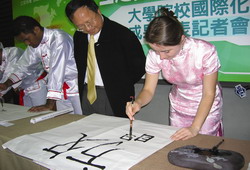Learning Foreign Languages - The Foundation for Internationalization

Currently, the center offers study of 23 languages including minority languages such as Manchurian, Mongolian, Tibetan, Uyghur, Hebrew, Persian and Czech. The language departments and the Department of Ethnology of Chengchi University , its allied schools and various nations' Taiwan offices provide the teachers needed. Currently, Hebrew, Portuguese, Persian, Vietnamese and Malay are taught by native speakers from Israel , Brazil , Iran , Vietnam and Malaysia , respectively.
Knowing the World through Languages
For example, Hebrew is taught by an Israeli. The class has always been a popular one, with over thirty enrolled each semester. The center notes only researchers study other minority languages such as Manchurian, Mongolian and Uyghur. Since Qinghai-Tibet Railway began commercial operation, many have inquired about the Tibetan class. In recent years, due to close interaction with southeastern Asian nations, study of their languages is becoming popular.
University Foreign Language Center in Northern Taiwan
Under MOE auspices, the center was set up at end of 2004. It has been in existence for nearly two years with 23 languages available for study by students or non-students. It will be the foundation for the internationalization of higher education. Meantime, the center has become the regional center to train foreign-language teachers. It provides support or training to foreign-language teachers of senior high schools or other universities. For example, it supports the teaching of a second language to students of neighboring Chengchi University-affiliated senior high school and Taipei Jingmei Girls High School in an effort to facilitate internationalization of education.
So far, the center has formed an alliance with Fu Jen Catholic University in northern Taiwan , Providence University in central Taiwan and Wenzao Ursuline College of Languages in southern Taiwan . Video distance learning has been introduced to teach eight languages. By sharing teacher resources, a preliminary foreign-language learning network has been established. In the future, a regional integration center will be set up in northern, central and southern Taiwan .
The center to this day has offered 23 foreign-language courses including English, Japanese, German, French, Spanish, Russian, Turkish, Arabic, Korean, Vietnamese, Malay, Thai, Polish, Czech, Portuguese, Hebrew, Persian, Manchurian, Tibetan, Mongolian, Uyghur, and -- starting this year in cooperation with Fu Jen Catholic University -- Latin and Italian.
The center also offers online learning of languages. Currently, there are seven minority languages available online. They include Arabic, Turkish, Russian, Vietnamese, Malay, Thai and Mongolian. Students of all universities in northern Taiwan can learn these languages online. So far, more than ten universities including Taiwan University , Chiao Tung University , Tsing Hua University , Taiwan Normal University, Hsinchu University of Education, Huafan University , Yuan Ze University and Tatung University are using the system. Starting September, the online service is available to students of universities across the nation (the website for the universities on the teaching platform to submit applications: http://wmpro.nccu.edu.tw ( Chinese website ) .
Languages Are the Key to Knowing the World
Minister Tu Cheng-sheng notes internationalization is not limited to English. Real internationalization depends on training multilingual individuals. He emphasizes it does not mean everyone has to learn a lot. It has to depend on each individual's ability and interest. Nevertheless, the more one has learned the better; at least the nation as a whole has to demonstrate the tendency of multilingualism.
He believes languages are the key to knowledge. Learning a language well is like opening a window and seeing another world. Otherwise, the window is closed and the world outside the window does not exist to you. That is why languages are important.
Learning Languages Takes Determination
Ph.D. Zhang Gu-ming -- Academia Sinica's newly-famed research fellow on world history – notes languages are the key to knowing the world. He encourages parents to let their children learn languages as much as they want. Since everyone knows English is the language that carries more information than other languages, learning English well equals to commanding much of the world's information and edge. Nevertheless, English cannot represent all languages because there are many fine cultures in the world that can only be understood and appreciated through their original languages. Therefore, everyone should also learn languages such as German, French and Japanese. Most people consider learning languages a difficult task. In fact, learning languages could be a lot of fun. "As long as you are interested, you can learn languages well. If you don't try, you can never learn a language well." Therefore, in addition to a favorable language-learning environment, learning languages takes determination and motive.